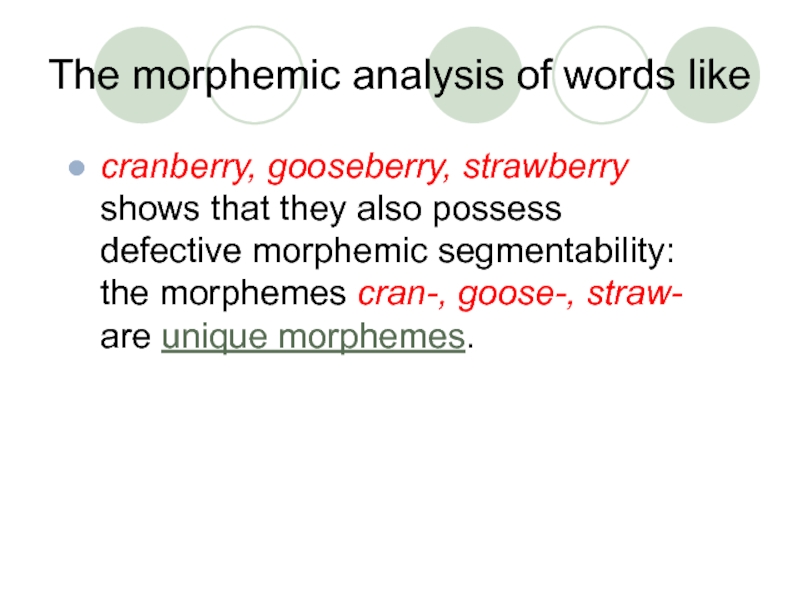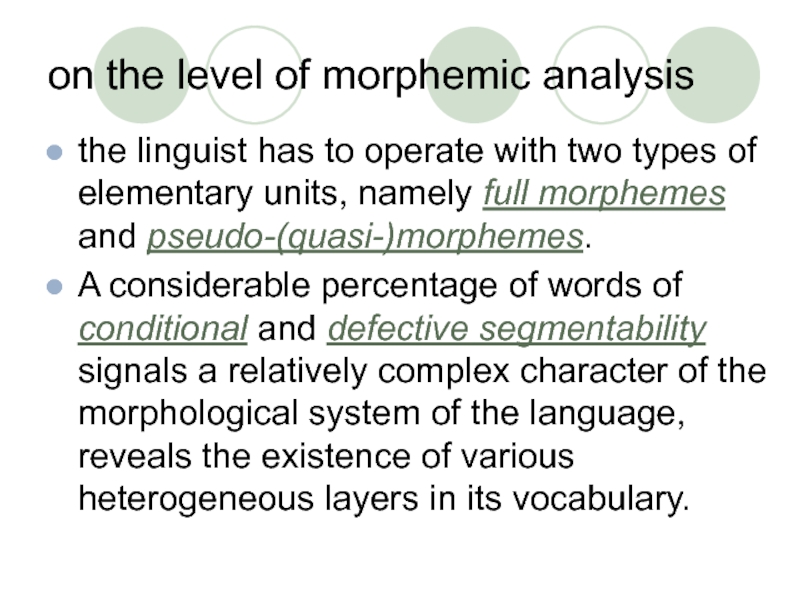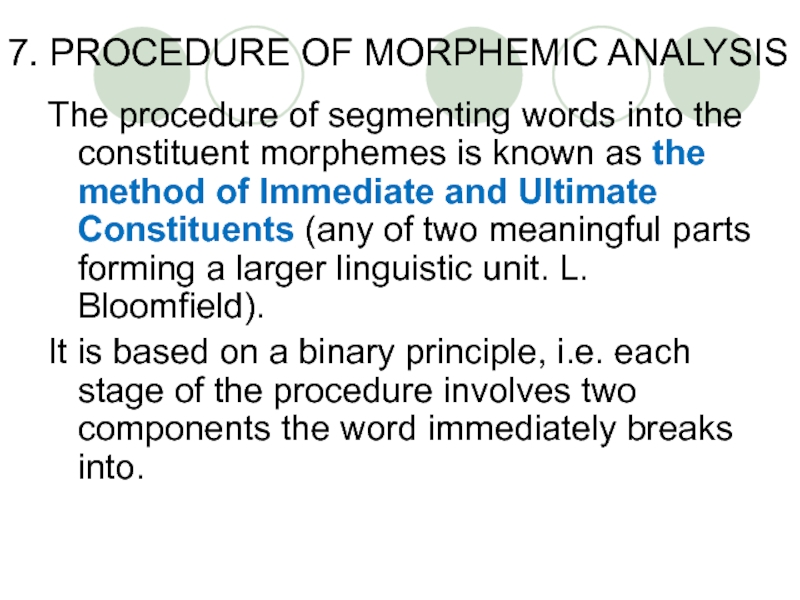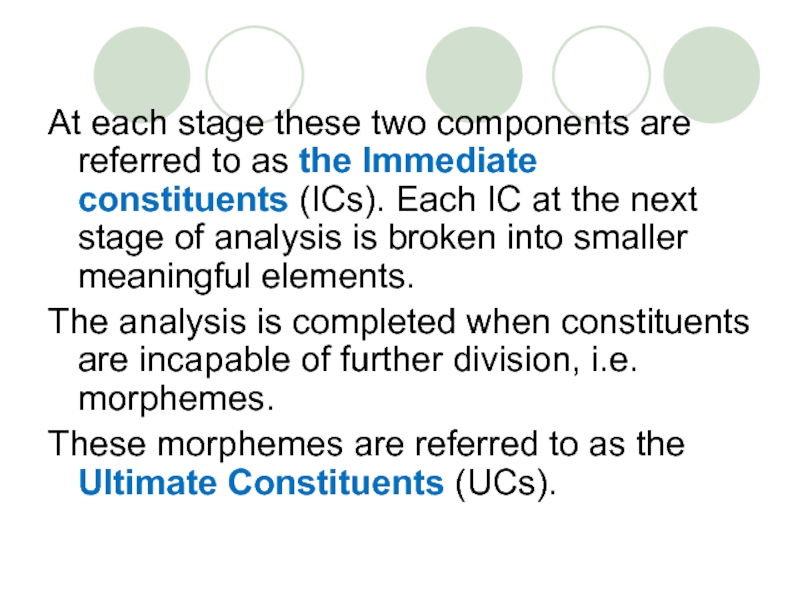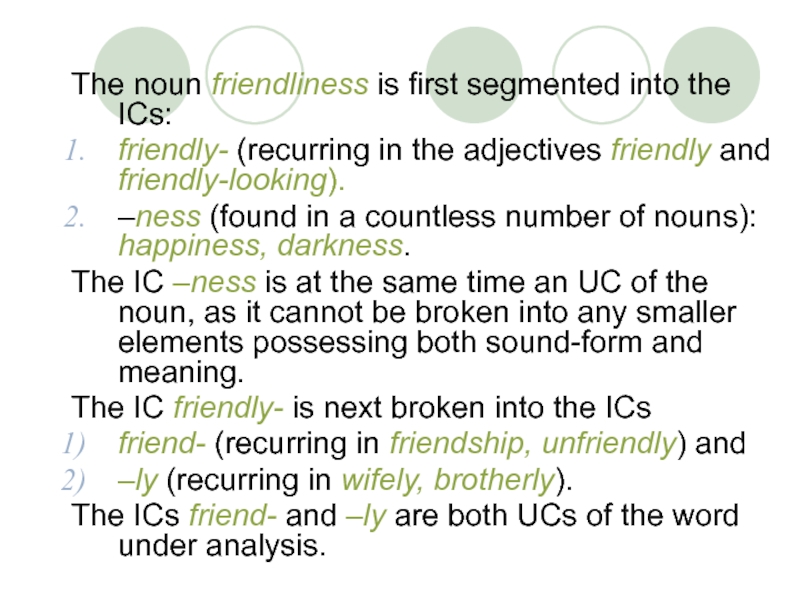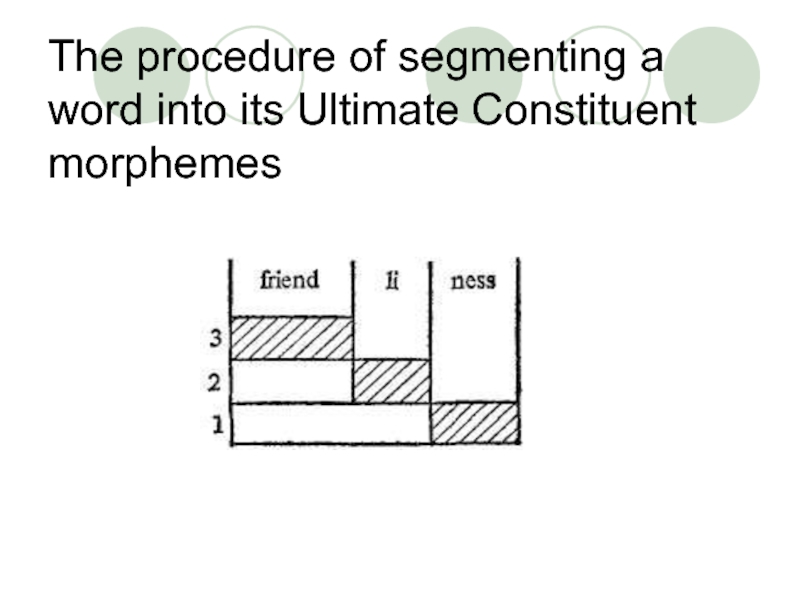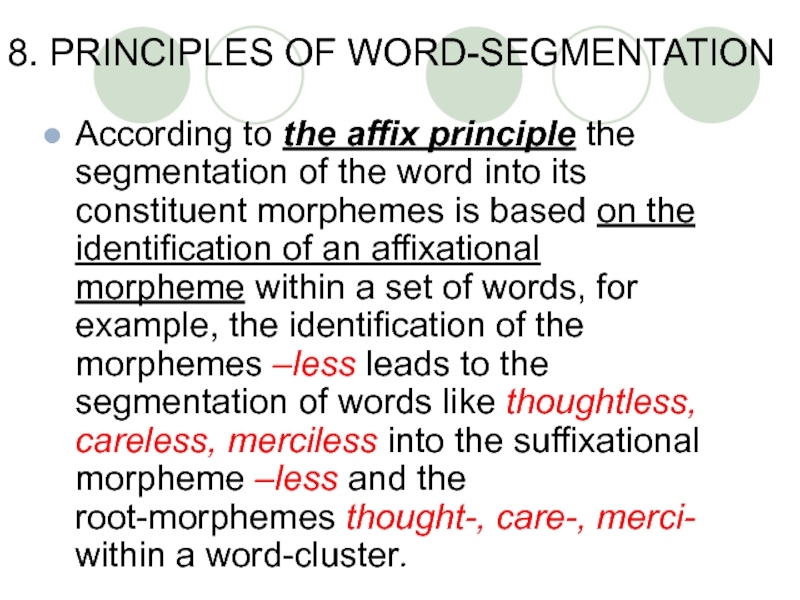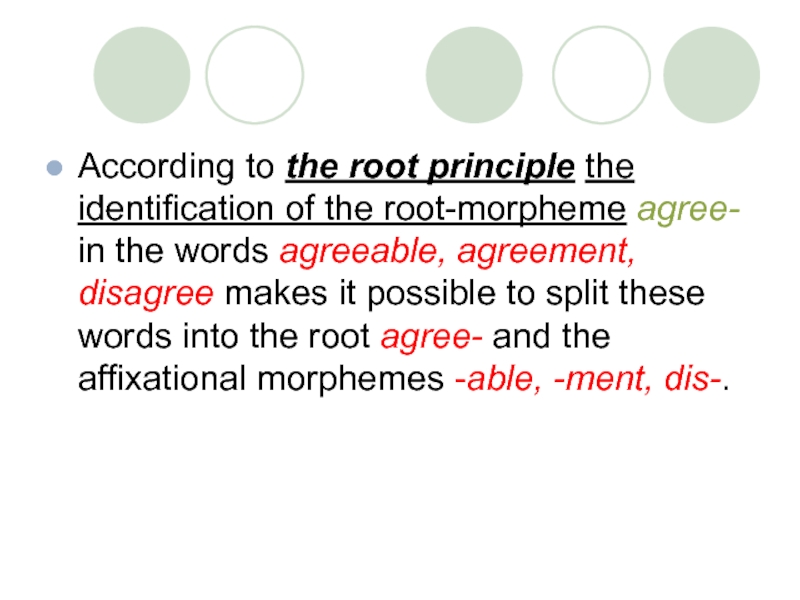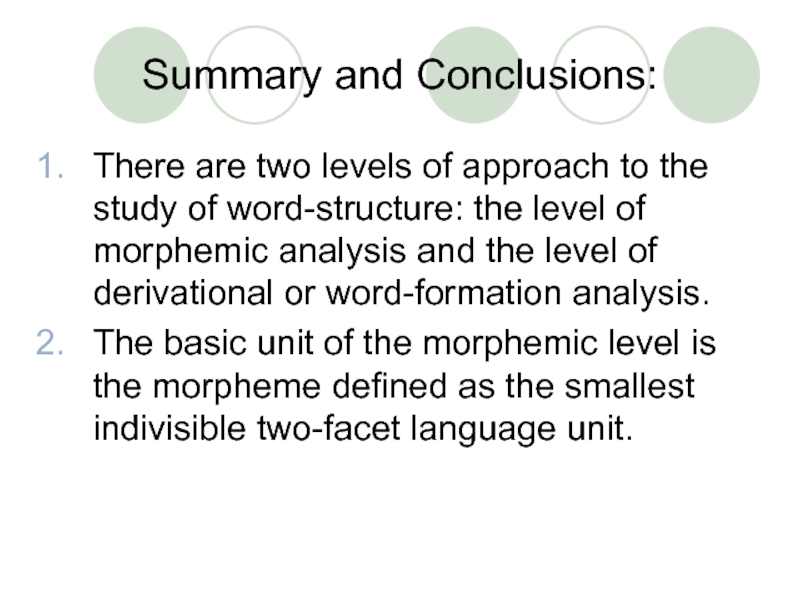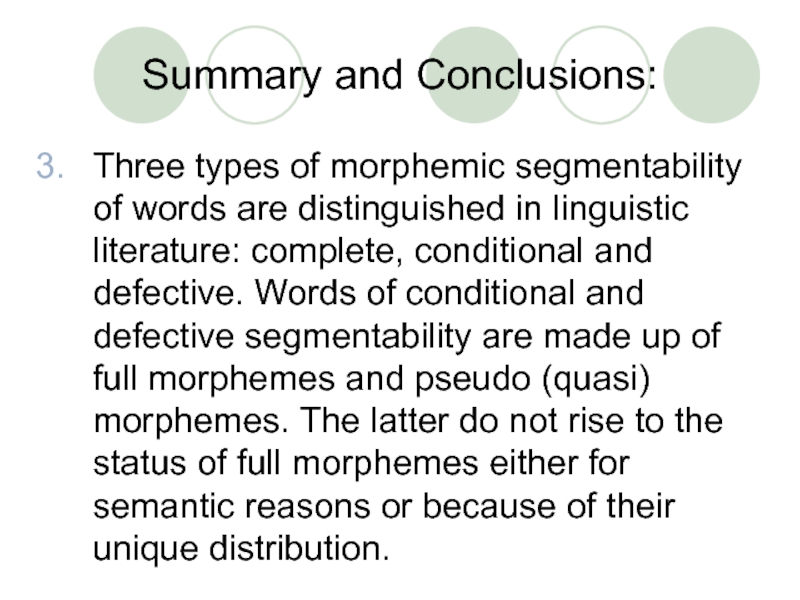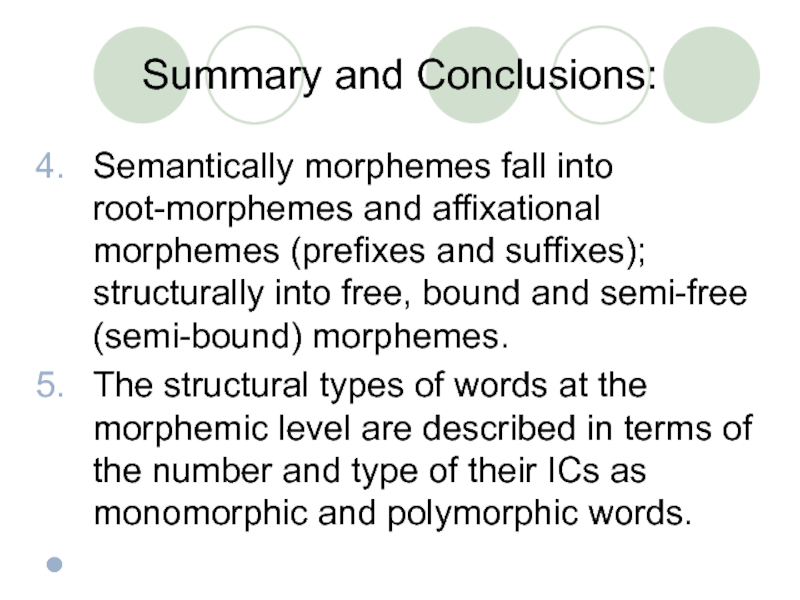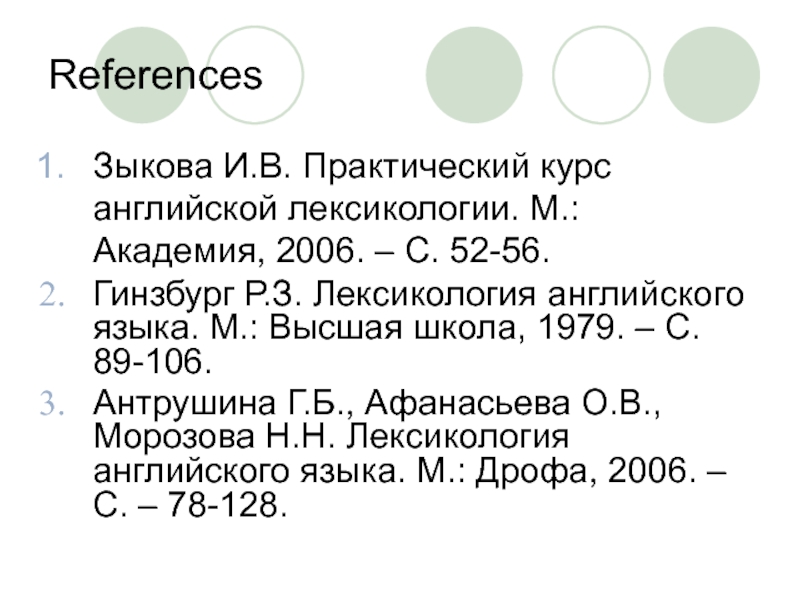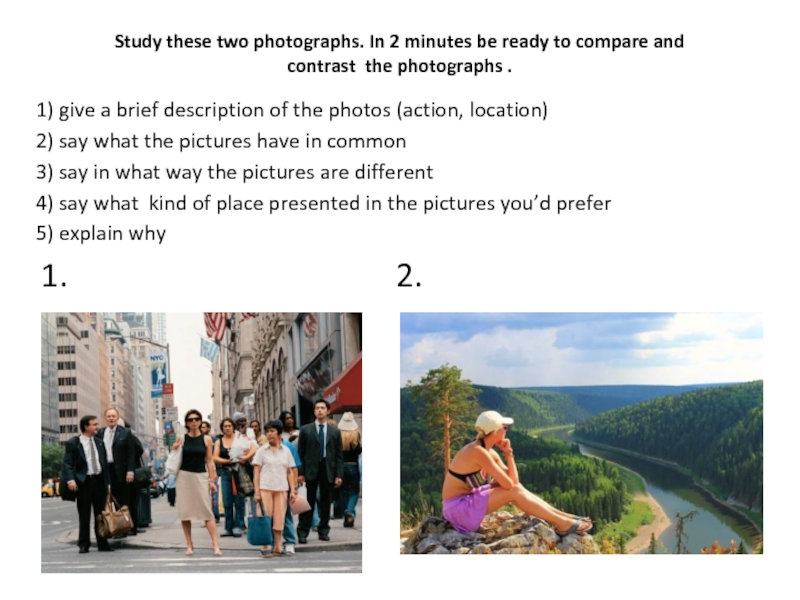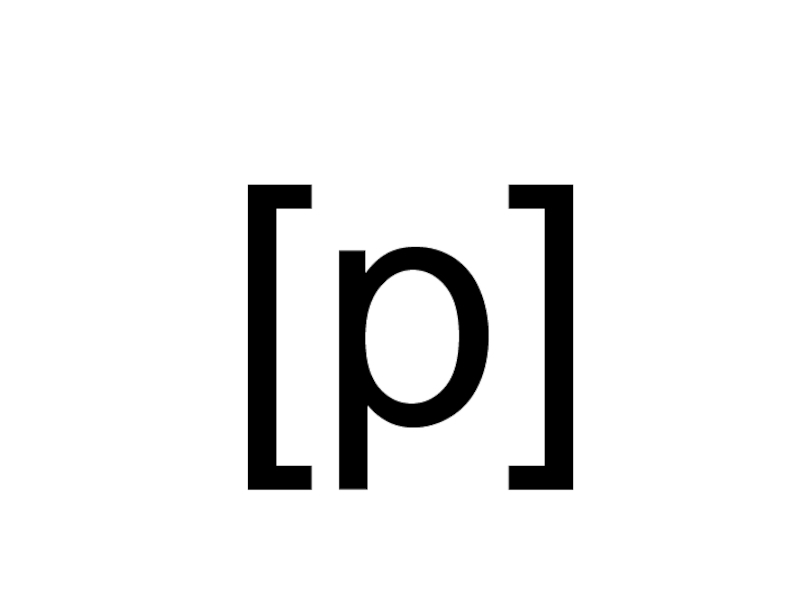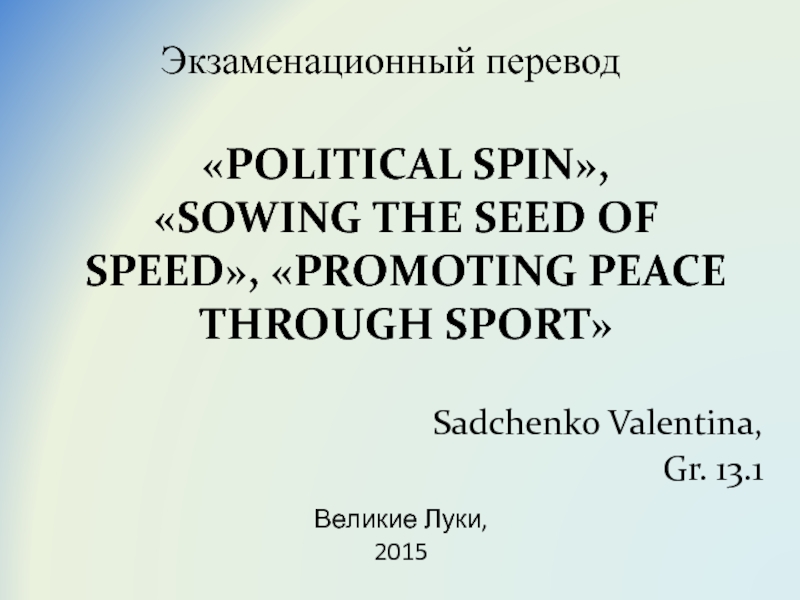- Главная
- Разное
- Дизайн
- Бизнес и предпринимательство
- Аналитика
- Образование
- Развлечения
- Красота и здоровье
- Финансы
- Государство
- Путешествия
- Спорт
- Недвижимость
- Армия
- Графика
- Культурология
- Еда и кулинария
- Лингвистика
- Английский язык
- Астрономия
- Алгебра
- Биология
- География
- Детские презентации
- Информатика
- История
- Литература
- Маркетинг
- Математика
- Медицина
- Менеджмент
- Музыка
- МХК
- Немецкий язык
- ОБЖ
- Обществознание
- Окружающий мир
- Педагогика
- Русский язык
- Технология
- Физика
- Философия
- Химия
- Шаблоны, картинки для презентаций
- Экология
- Экономика
- Юриспруденция
Morphemic Structure of Words презентация
Содержание
- 1. Morphemic Structure of Words
- 2. 1. Word-Structure and Morphemes Morphe –
- 3. MORPHEMES Morphemes cannot be segmented into smaller
- 4. SEGMENTATION OF WORDS INTO MORPHEMES Boiler
- 5. SEGMENTATION OF WORDS INTO MORPHEMES flower-pot
- 6. Word-cluster please pleasing
- 7. The root-morphemes in the word-clusters Duke
- 8. 2.1. Semantic Classification of Morphemes Root-morphemes (radicals)
- 9. Non-root morphemes Non-root morphemes include inflectional morphemes
- 10. 2.2. Structural Classification of Morphemes A free
- 11. All unique roots and pseudo-roots are-bound morphemes.
- 12. Semi-bound (semi-free) morphemes -morphemes that can function
- 13. The relationship between the two classifications of morphemes
- 14. Word-structure on the morphemic level: 1st
- 15. The 2nd Group embraces morphemes occupying a
- 16. 3. TYPES OF MEANING IN MORPHEMES In
- 17. 3.1. LEXICAL MEANING Root-morphemes have an individual
- 18. Morphemes may be also analyzed into denotational
- 19. The affixational morphemes with the same denotational
- 20. Stylistic reference may be found in morphemes
- 21. 3.2. DIFFERENTIAL MEANING Differential meaning is the
- 22. 3.2. DISTRIBUTIONAL MEANING Distributional meaning is the
- 23. 3.4. PART-OF-SPEECH MEANING Part-of-speech meaning is the
- 24. 4. MORPHEMIC TYPES OF WORDS According to
- 25. Polymorphic words according to the number of
- 26. Polyradical words (having words consisting of two
- 27. 5. TYPES OF WORD-SEGMENTABILITY Word-segmentability is
- 28. 5.1. COMPLETE SEGMENTABILITY Complete segmentability is
- 29. The morphemes making up words of complete
- 30. 5.2. CONDITIONAL SEGMENTSBILITY Conditional segmentability characterizes words
- 31. Neither [ri-], [di-] nor [-tain], [si:v] possess
- 32. The morphemes making up words of conditional
- 33. 5.3. DEFECTIVE SEGMENTABILITY Defective segmentability is the
- 34. In the word hamlet the morpheme -let
- 35. comparison with words locket, lionet, cellaret,
- 36. The isolation of the morpheme -et leaves
- 37. The morphemic analysis of words like
- 38. on the level of morphemic analysis
- 39. 7. PROCEDURE OF MORPHEMIC ANALYSIS The procedure
- 40. At each stage these two components are
- 41. The noun friendliness is first segmented into
- 42. The procedure of segmenting a word into its Ultimate Constituent morphemes
- 43. 8. PRINCIPLES OF WORD-SEGMENTATION According to the
- 44. According to the root principle the identification
- 45. Summary and Conclusions: There are two levels
- 46. Summary and Conclusions: Three types of morphemic
- 47. Summary and Conclusions: Semantically morphemes fall into
- 48. References Зыкова И.В. Практический курс английской лексикологии.
Слайд 21. Word-Structure and Morphemes
Morphe – ‘form’ + -eme. The Greek suffix
Word-structure is internal organization of words.
The morpheme is the smallest indivisible two-facet language unit.
Слайд 3MORPHEMES
Morphemes cannot be segmented into smaller units without losing their constitutive
Morphemes occur in speech only as constituent parts of words but not independently.
Слайд 4SEGMENTATION OF WORDS
INTO MORPHEMES
Boiler = boil- + er;
Driller = drill-
recurrence of the morpheme -er in these and other similar words and of the morphemes boil- and drill- in
to boil, a boil, boiling and
to drill, a drill, drilling, a drill-press, etc.
Слайд 5SEGMENTATION OF WORDS
INTO MORPHEMES
flower-pot = flower- + -pot;
shoe-lace = shoe-
Like a word a morpheme is a two-facet language unit, an association of a certain meaning with a certain sound-pattern.
Unlike a word a morpheme is not an autonomous unit and can occur in speech only as a constituent part of the word.
Lace [l], [ei] ,[s] - without meaning.
Слайд 6Word-cluster
please pleasing pleasure pleasant
All the representations of the given morpheme that manifest alteration are called allomorphs of that morpheme or morpheme variants.
Thus, [pli:z], [plez] and [рlеʒ] are allomorphs of оnе and the same morpheme.
Слайд 7The root-morphemes
in the word-clusters
Duke [dju:k], ducal ['dju:kl],
duchess [‘d˄tʃiƨ], duchy
or
Poor [puə] , poverty [‘povəti] -
are the allomorphs of one morpheme
Слайд 82.1. Semantic Classification of Morphemes
Root-morphemes (radicals) - the lexical nucleus of
Helpless, handy, rewrite, hopeful, disorder
Help- hand- -write hope- -order
The root-morpheme is isolated as the morpheme common to a set of words making up a word-cluster:
work- in to work, worker, working or
theor- in theory, theorist, theoretical, etc.
Слайд 9Non-root morphemes
Non-root morphemes include inflectional morphemes (inflections) and affixational morphemes (affixes).
Lexicology is concerned only with affixational morphemes.
A prefix: understand – mis-understand, correct – in-correct).
A suffix: (-en, -y, -less in heart-en heart-y, heart-less).
Слайд 102.2. Structural Classification of Morphemes
A free morpheme - one that coincides
A bound morpheme - a morpheme that must be attached to another element. It occurs only as a constituent part of a word. Affixes are bound morphemes for they always make part of a word, for example:-ness, -ship in the words kind-ness, friend-ship; un-, dis- in the words un-tidy, dis-like.
Слайд 11All unique roots and pseudo-roots are-bound morphemes.
Such are the root-morphemes
barbar-in barbarism, barbarian, etc.,
-ceive in conceive, perceive, etc.
Слайд 12Semi-bound (semi-free) morphemes -morphemes that can function in a morphemic sequence
They can also occur as bound morphemes in words like well-known, half-eaten, half-done.
Слайд 14Word-structure
on the morphemic level:
1st Group - Combining forms are morphemes
Phonoscope = ‘sound’ + ‘seeing’;
Microscope = ‘smallness’ + ‘seeing’;
Telegraph = ‘far’ + ‘writing’;
Слайд 15The 2nd Group embraces morphemes occupying a kind of intermediate position,
Root morpheme man – in postman, fisherman, gentleman, etc. in comparison with man-made, man-servant.
-man = -er; in cabman, chairman, tradesman
Not a male adult But agent!
* She is an Englishman
*All women are tradesmen.
Слайд 163. TYPES OF MEANING IN MORPHEMES
In morphemes can be singled out
Root-morphemes have lexical, differential and distributional types of meaning.
Affixational morphemes have lexical, part of-speech, differential and distributional types of meaning.
Both root-morphemes and affixational morphemes are devoid of grammatical meaning.
Слайд 173.1. LEXICAL MEANING
Root-morphemes have an individual lexical meaning shared by no
Affixational morphemes have a more generalizing character of lexical meaning: the suffix –en carries the meaning “the change of a quality”, e.g. to lighten – to become lighter, to deafen – to make somebody deaf.
Слайд 18Morphemes may be also analyzed into denotational and connotational components:
The
Слайд 19The affixational morphemes with the same denotational meaning sometimes differ only
Слайд 20Stylistic reference may be found in morphemes of different types: the
-ine (chlorine), -oid (rhomboid)
are bookish.
Слайд 213.2. DIFFERENTIAL MEANING
Differential meaning is the semantic component that serves to
Слайд 223.2. DISTRIBUTIONAL MEANING
Distributional meaning is the meaning of the order and
It is found in all words containing more than one morpheme: the word teacher is composed of two morphemes teach- and –er both of which possess the denotational meaning ‘to help students to learn something’ and ‘the doer of the action’.
A different arrangement of the same morphemes *erteach would make the word meaningless.
Слайд 233.4. PART-OF-SPEECH MEANING
Part-of-speech meaning is the indicative of the part of
Sometimes the part-of-speech meaning of morphemes predominates: the morpheme –ice in the word justice serves principally to transfer the part-of-speech meaning of the morpheme just- into another class and namely that of the noun.
Слайд 244. MORPHEMIC TYPES OF WORDS
According to the number of morphemes words
Monomorphic or root-words consist of only one root-morpheme: small, dog, make, put, doll, pen, ect.
Слайд 25Polymorphic words according to the number of root-morphemes are classified into:
Monoradical words (having one-root morpheme) fall into three subtypes:
radical-suffixal words, i.e. words consisting of one root-morpheme and two or more suffixal morphemes, for example, respectable, respectability;
radical-prefixal words, i.e. words consisting of one root-morpheme and a prefixal morpheme, for example, overcome, unbutton;
prefixo-radical-suffixal words, i.e. words which consist of one root, prefixal and suffixal morphemes (e.g. unforgettable, misinterpretation).
Слайд 26Polyradical words (having words consisting of two or more roots) fall
polyradical words which consist of two or more roots with no affixational morpheme, for example, pen-friend, copybook;
polyradical words which contain at least two roots and one or more affixational morpheme, for instance, safety-pin, light-mindedness, pen-holder.
Слайд 275. TYPES OF WORD-SEGMENTABILITY
Word-segmentability is the division of words into
Three types of morphemic segmentability of words are distinguished:
complete,
conditional,
defective.
Слайд 285.1. COMPLETE SEGMENTABILITY
Complete segmentability
is characteristic of words, the morphemic structure
Слайд 29The morphemes making up words of complete segmentability are called morpheme
The transparent morphemic structure of the segmentable words careless, stressful is conditioned by the fact that their constituent morpheme recur with the same meaning in other words: thoughtful, powerful.
Слайд 305.2. CONDITIONAL SEGMENTSBILITY
Conditional segmentability characterizes words whose segmentation into the constituent
In the words retain, detain or deceive the sound-cluster – [ri-], [di-] seem to be singled out easily due to their recurrence in a number of words (cf. rewrite, reorganize, decode, deorganize).
Слайд 31Neither [ri-], [di-] nor [-tain], [si:v] possess any lexical or part-of-speech
They have differential and distributional meanings: the [ri-] distinguishes retain from detain and the [-tein] distinguishes retain from receive, whereas their order and arrangement point to the status of the re-, de- as different from that of the –tain and –ceive within the structure of the words.
Слайд 32The morphemes making up words of conditional segmentability do not rise
quasi-morphemes.
Слайд 335.3. DEFECTIVE SEGMENTABILITY
Defective segmentability is the property of words whose component
One of the component morphemes of these words is a unique morpheme, which is isolated and understood as meaningful because the constituent morphemes display a more or less clear denotational meaning.
In streamlet, ringlet, leaflet the morpheme –let has diminutive meaning.
Слайд 34In the word hamlet the morpheme -let has the meaning of
The sound-cluster [hæm-] does not recur in any other English word.
The morpheme ham- carries a differential and distributional meaning as it distinguishes hamlet from streamlet, ringlet.
Слайд 35comparison with words
locket, lionet, cellaret, etc. leads one to the
Слайд 36The isolation of the morpheme -et leaves in the word pocket
The morpheme [роk] clearly carries a differential and distributional meaning as it distinguishes pocket from the words mentioned above and thus must be qualified as a unique morpheme.
Слайд 37The morphemic analysis of words like
cranberry, gooseberry, strawberry shows that
Слайд 38on the level of morphemic analysis
the linguist has to operate
A considerable percentage of words of conditional and defective segmentability signals a relatively complex character of the morphological system of the language, reveals the existence of various heterogeneous layers in its vocabulary.
Слайд 397. PROCEDURE OF MORPHEMIC ANALYSIS
The procedure of segmenting words into the
It is based on a binary principle, i.e. each stage of the procedure involves two components the word immediately breaks into.
Слайд 40At each stage these two components are referred to as the
The analysis is completed when constituents are incapable of further division, i.e. morphemes.
These morphemes are referred to as the Ultimate Constituents (UCs).
Слайд 41The noun friendliness is first segmented into the ICs:
friendly- (recurring
–ness (found in a countless number of nouns): happiness, darkness.
The IC –ness is at the same time an UC of the noun, as it cannot be broken into any smaller elements possessing both sound-form and meaning.
The IC friendly- is next broken into the ICs
friend- (recurring in friendship, unfriendly) and
–ly (recurring in wifely, brotherly).
The ICs friend- and –ly are both UCs of the word under analysis.
Слайд 438. PRINCIPLES OF WORD-SEGMENTATION
According to the affix principle the segmentation of
Слайд 44According to the root principle the identification of the root-morpheme agree-
Слайд 45Summary and Conclusions:
There are two levels of approach to the study
The basic unit of the morphemic level is the morpheme defined as the smallest indivisible two-facet language unit.
Слайд 46Summary and Conclusions:
Three types of morphemic segmentability of words are distinguished
Слайд 47Summary and Conclusions:
Semantically morphemes fall into root-morphemes and affixational morphemes (prefixes
The structural types of words at the morphemic level are described in terms of the number and type of their ICs as monomorphic and polymorphic words.
Слайд 48References
Зыкова И.В. Практический курс английской лексикологии. М.: Академия, 2006. – С.
Гинзбург Р.З. Лексикология английского языка. М.: Высшая школа, 1979. – С. 89-106.
Антрушина Г.Б., Афанасьева О.В., Морозова Н.Н. Лексикология английского языка. М.: Дрофа, 2006. – С. – 78-128.
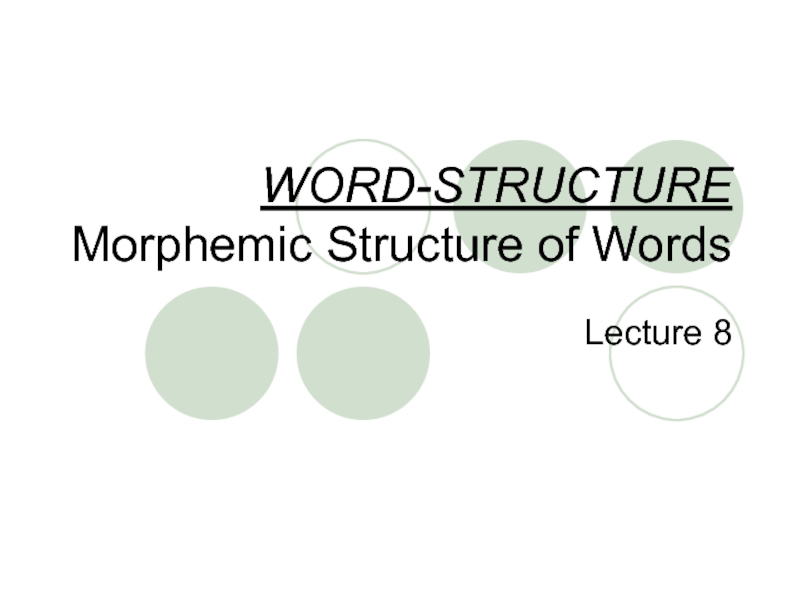
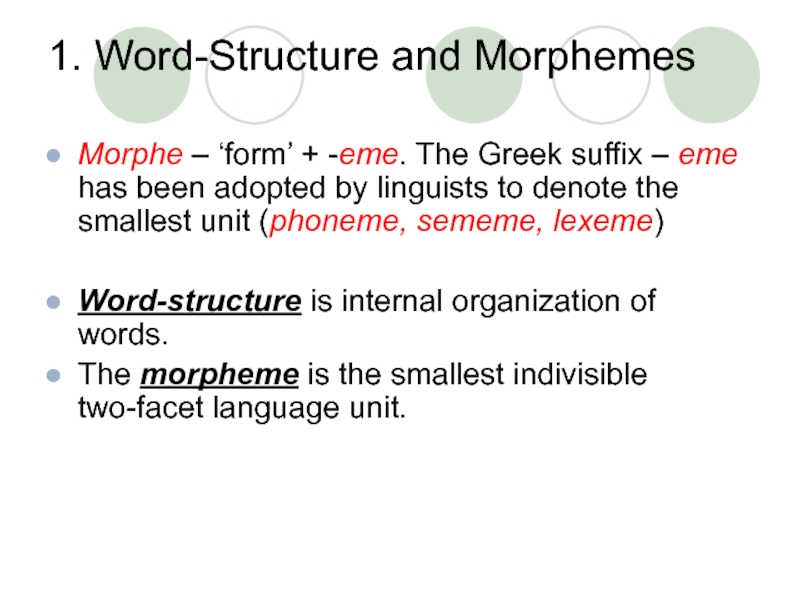
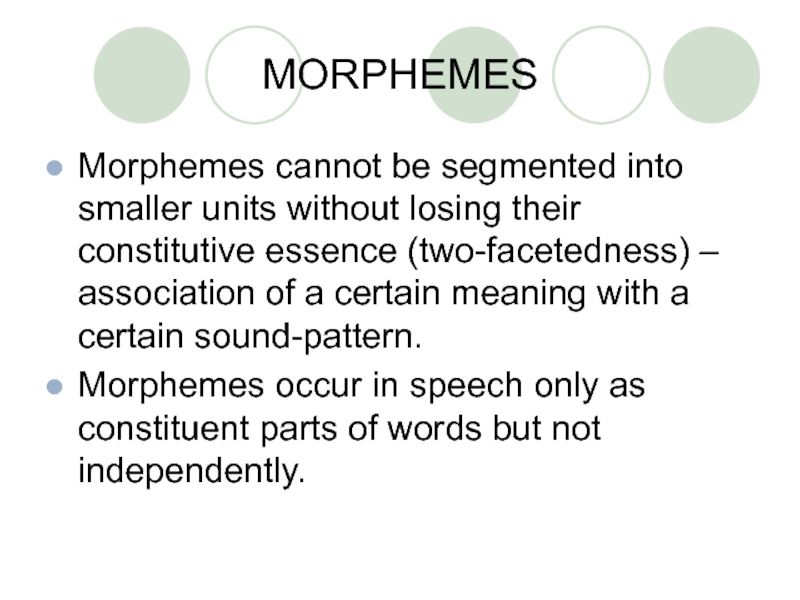
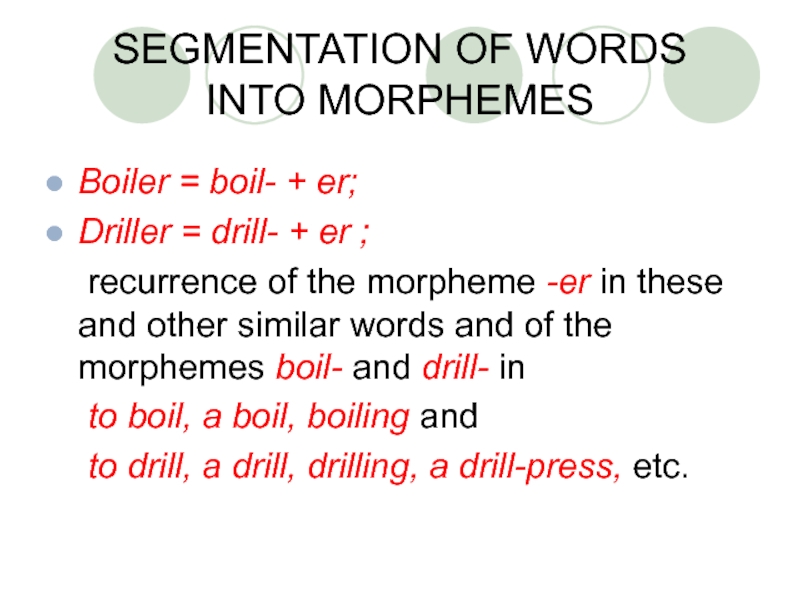
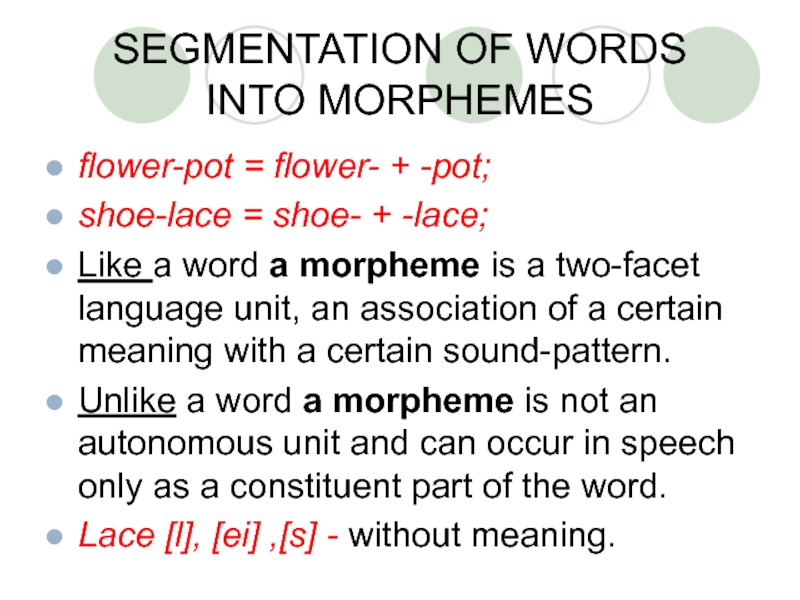
![Word-cluster please pleasing pleasure pleasant [pli:z] [pli:z] [pleʒ]](/img/tmb/5/464272/1cba0a55ad15a9af6716368ccd8273bb-800x.jpg)
![The root-morphemes in the word-clustersDuke [dju:k], ducal ['dju:kl], duchess [‘d˄tʃiƨ], duchy [‘d˄tʃi] orPoor [puə] , poverty](/img/tmb/5/464272/fa6410c66ad1e39ef95b89eb4db1e019-800x.jpg)
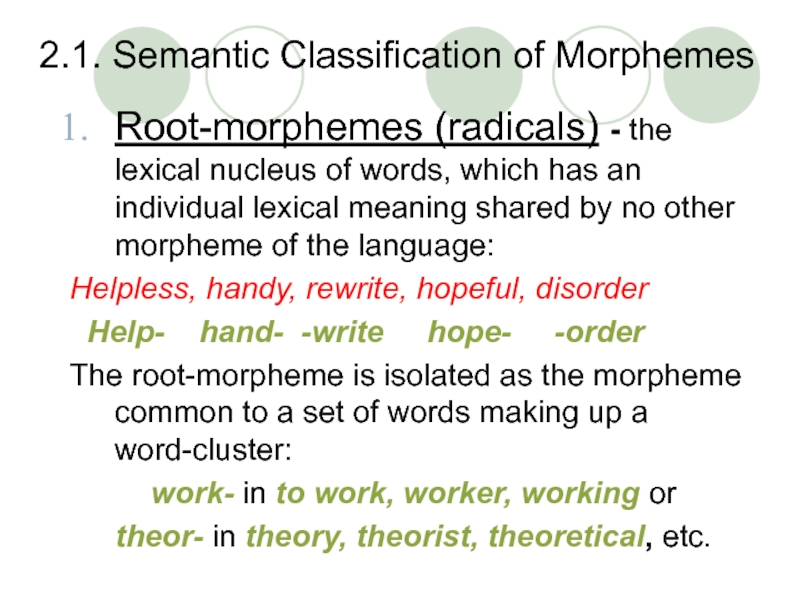
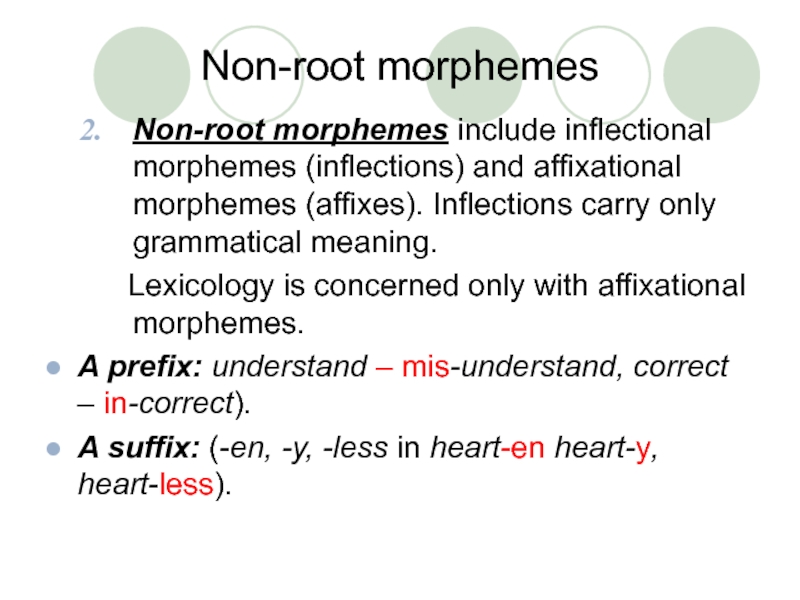
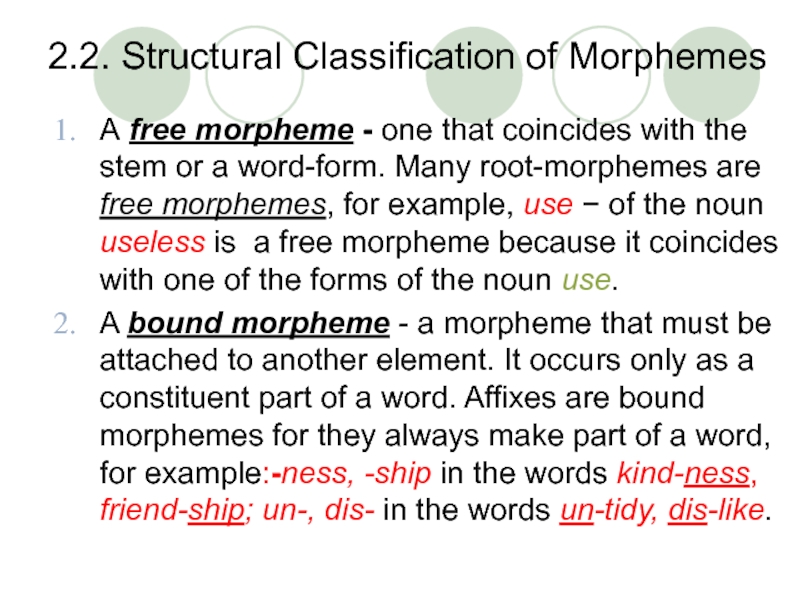
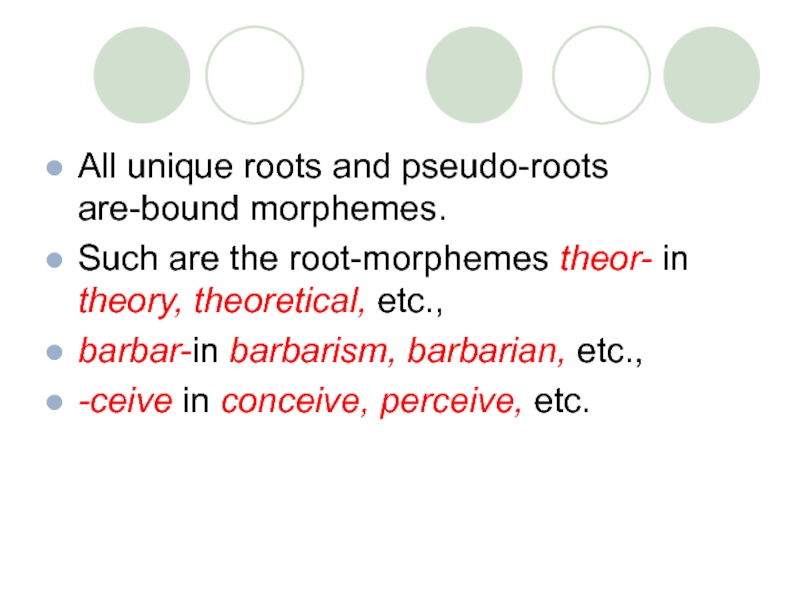
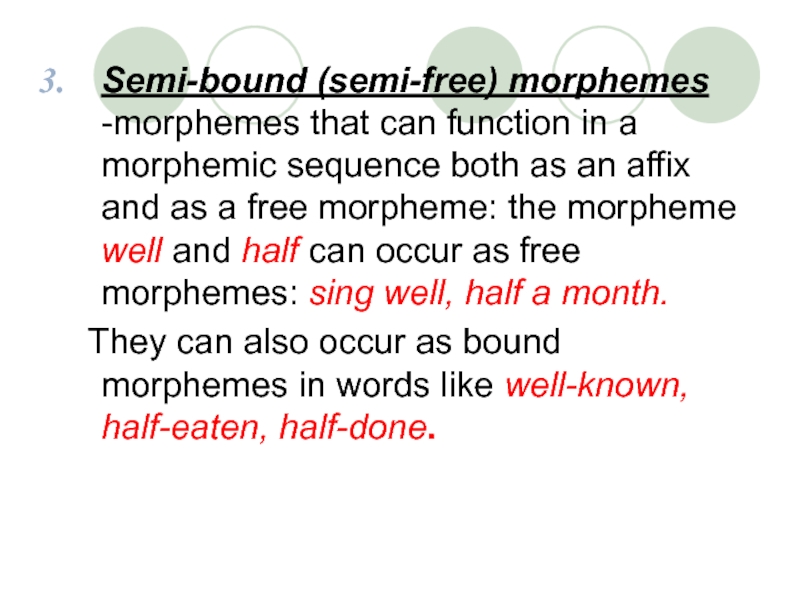
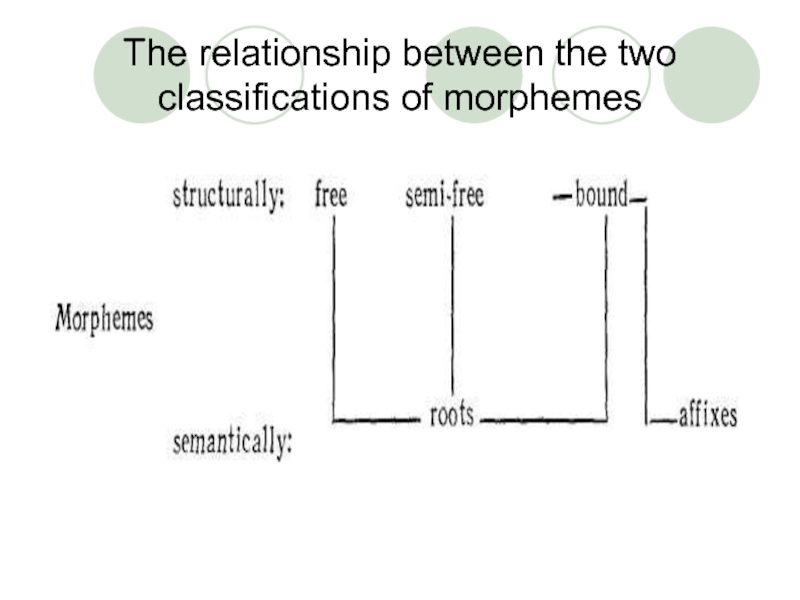
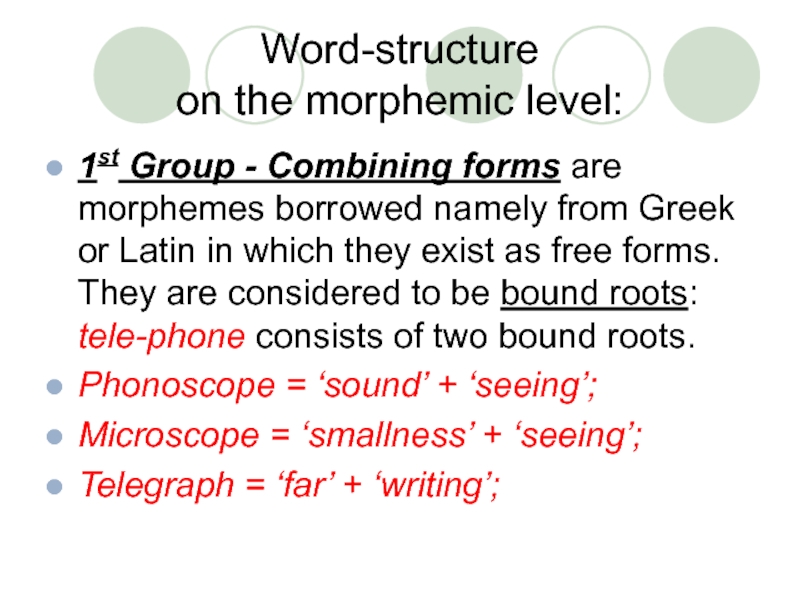
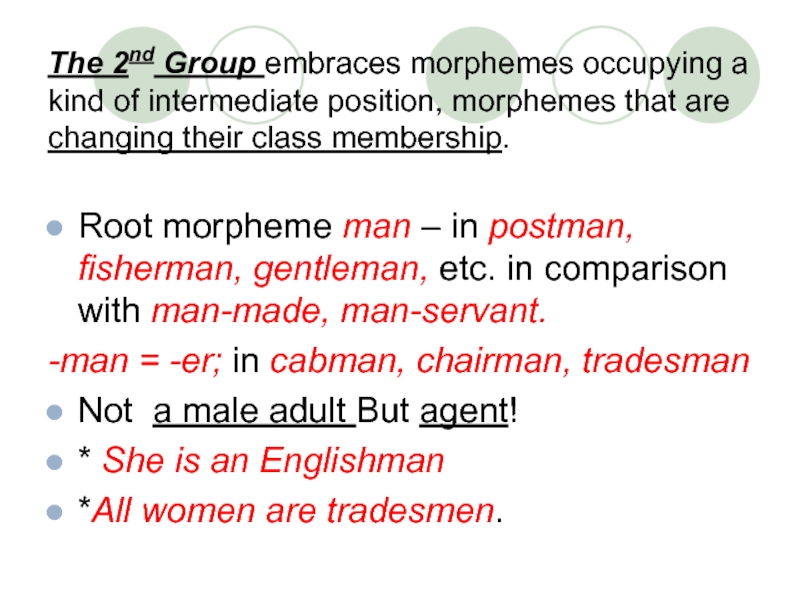
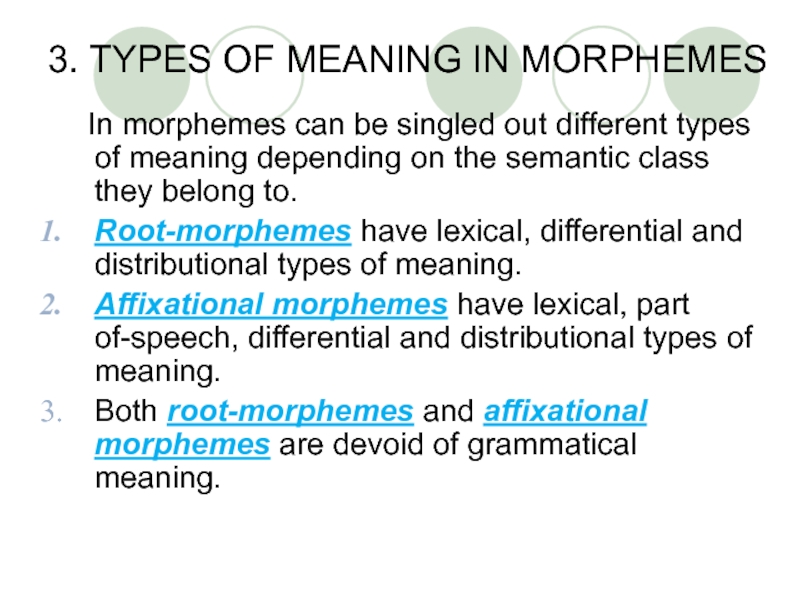
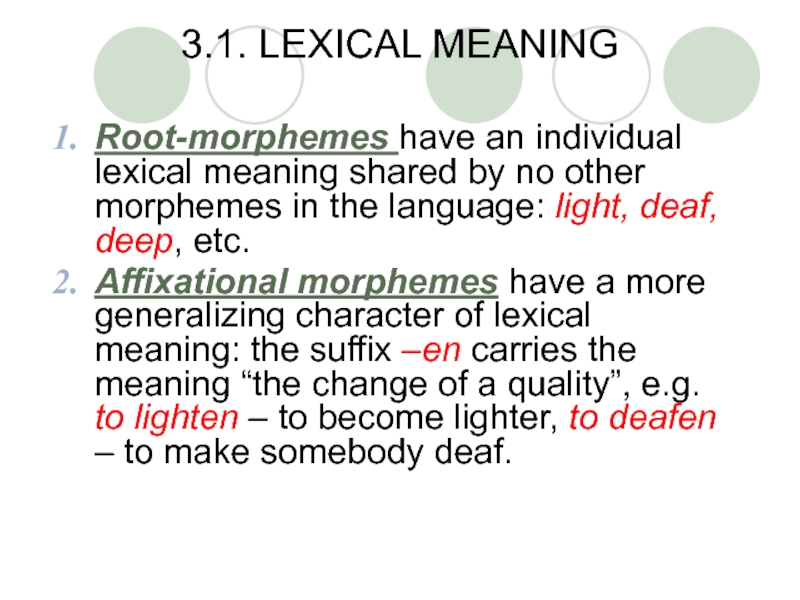
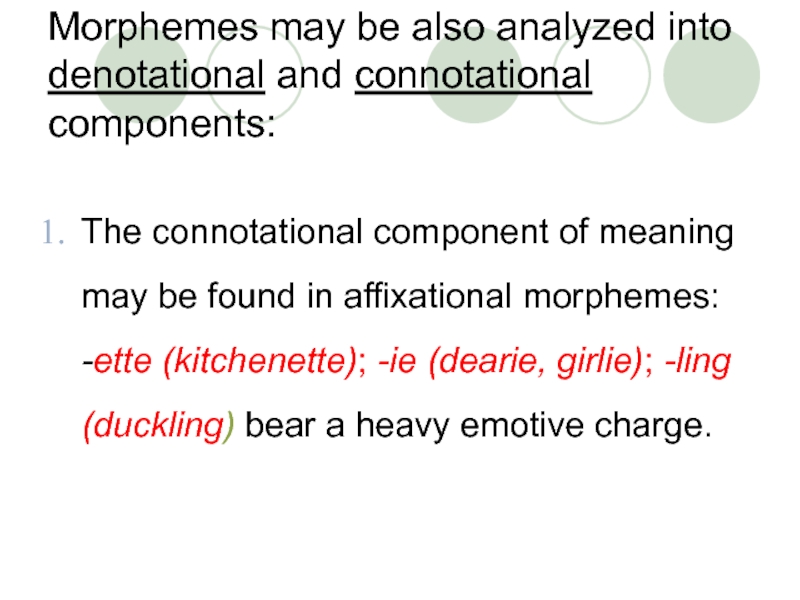
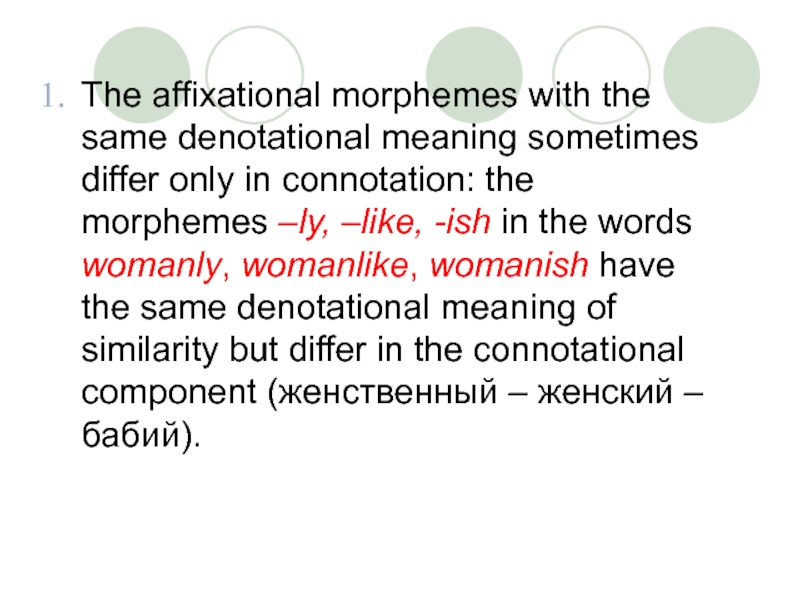
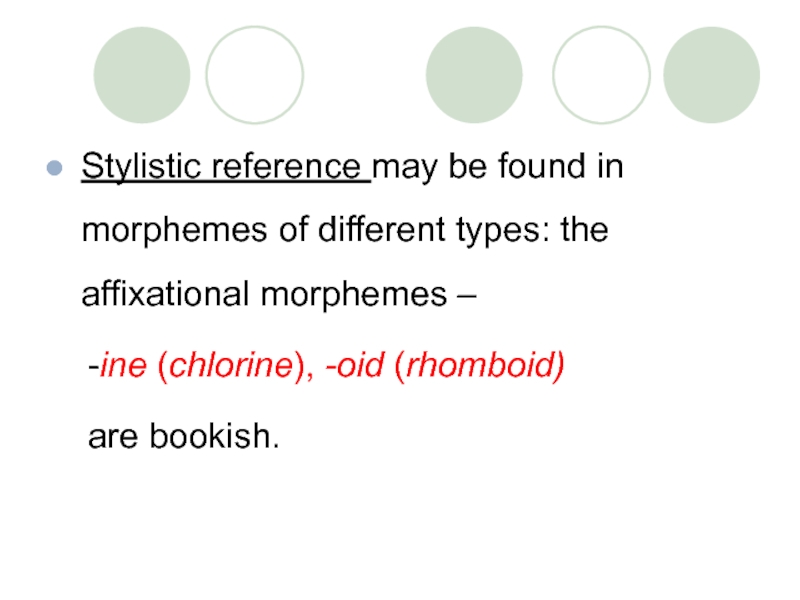
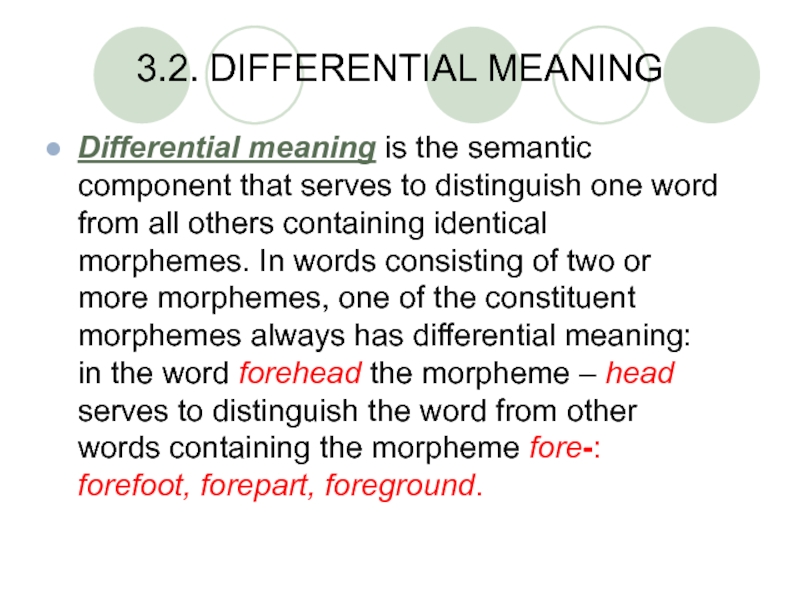
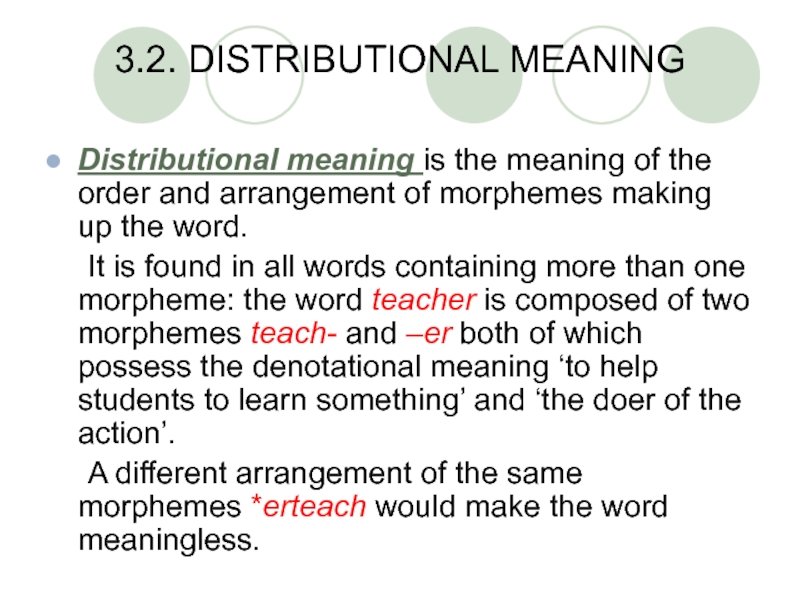
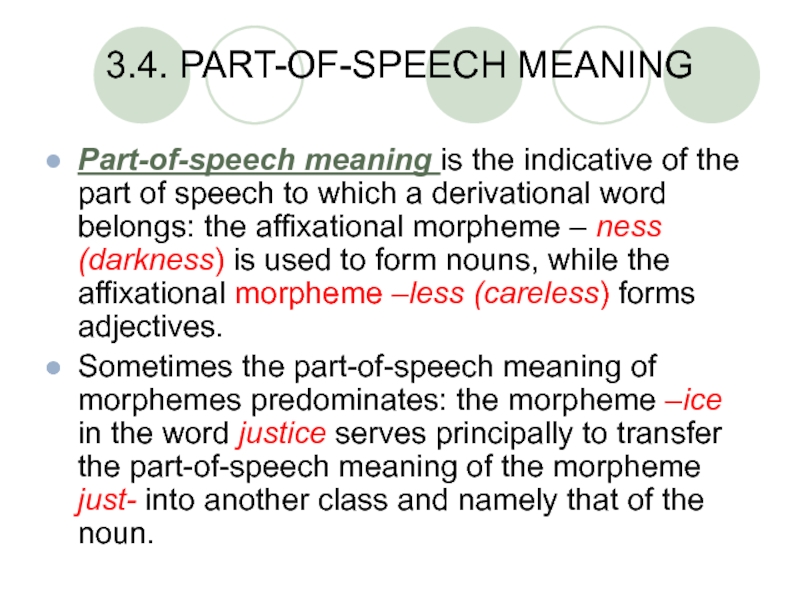
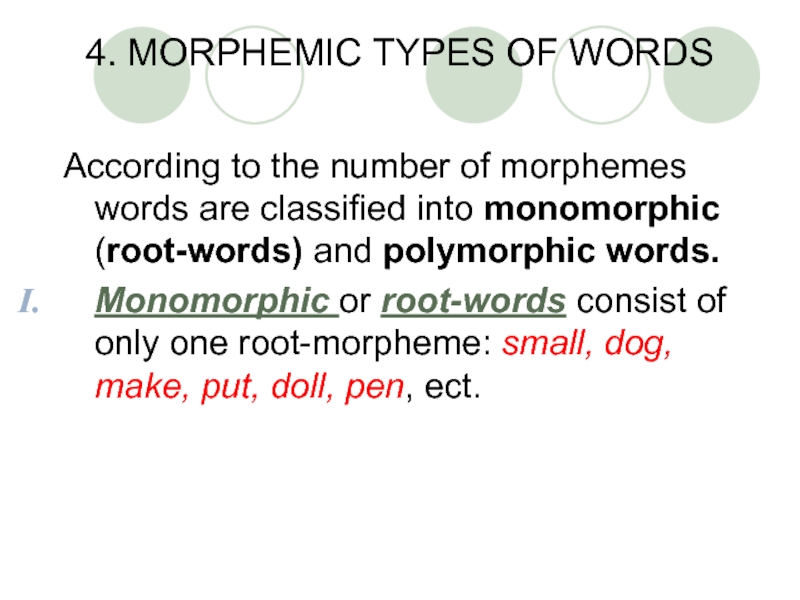
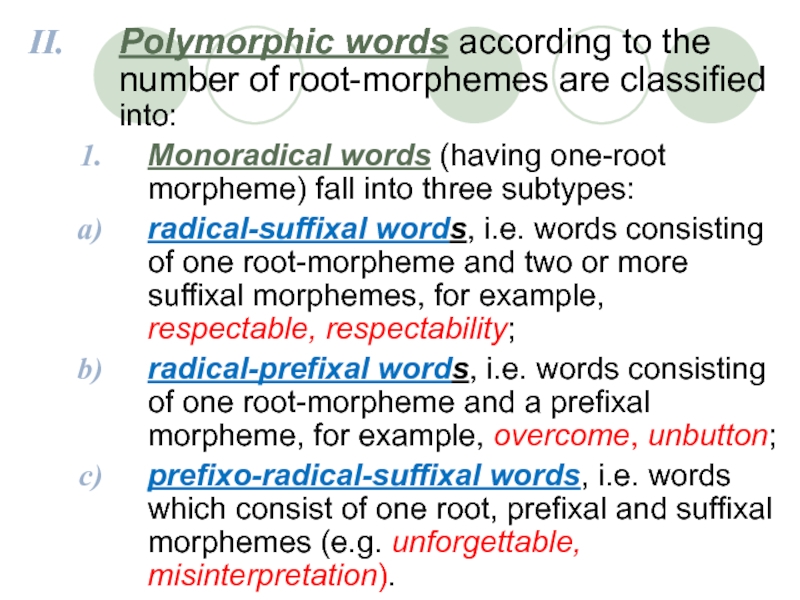
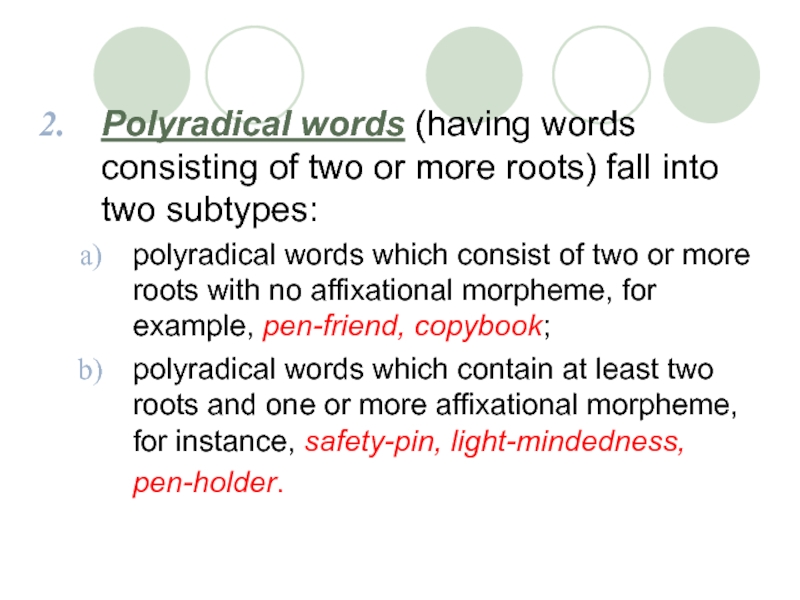
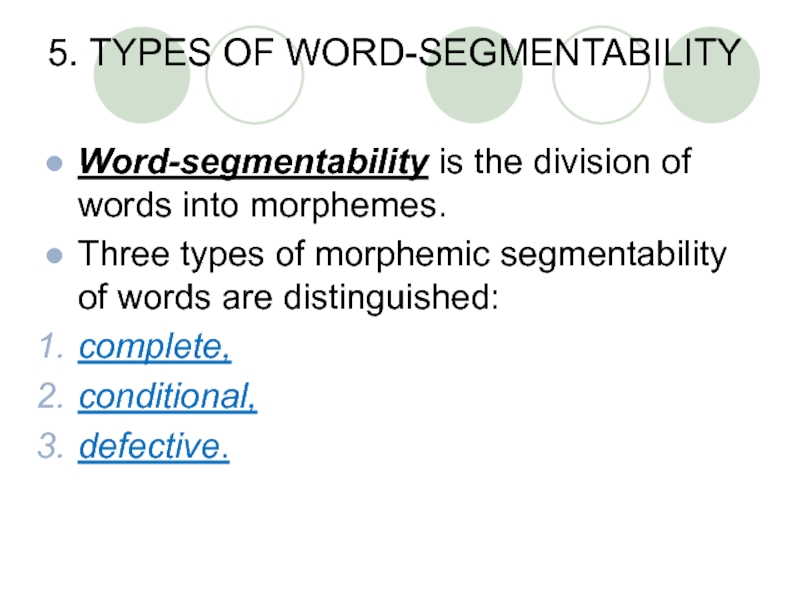
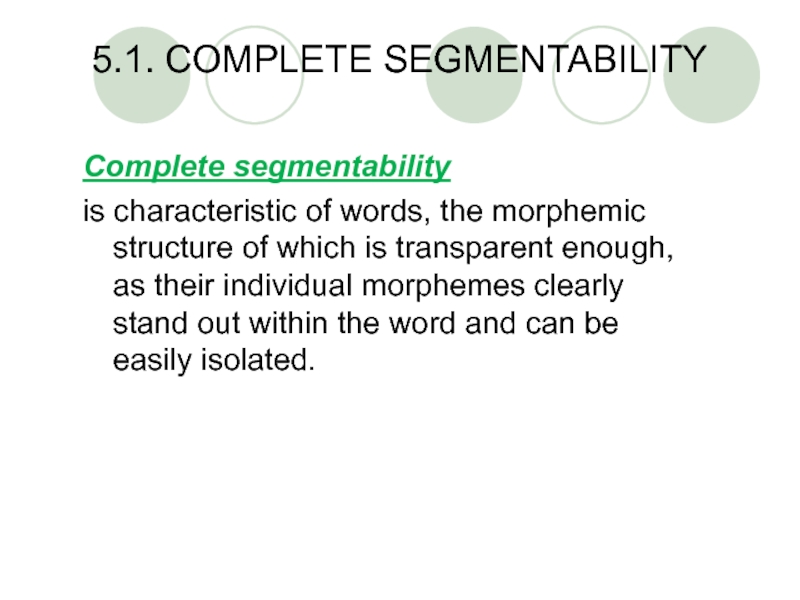
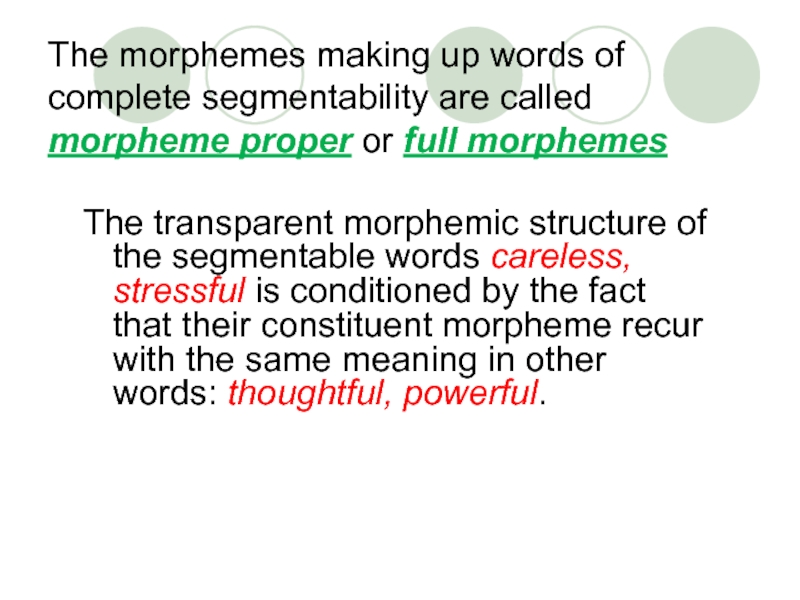
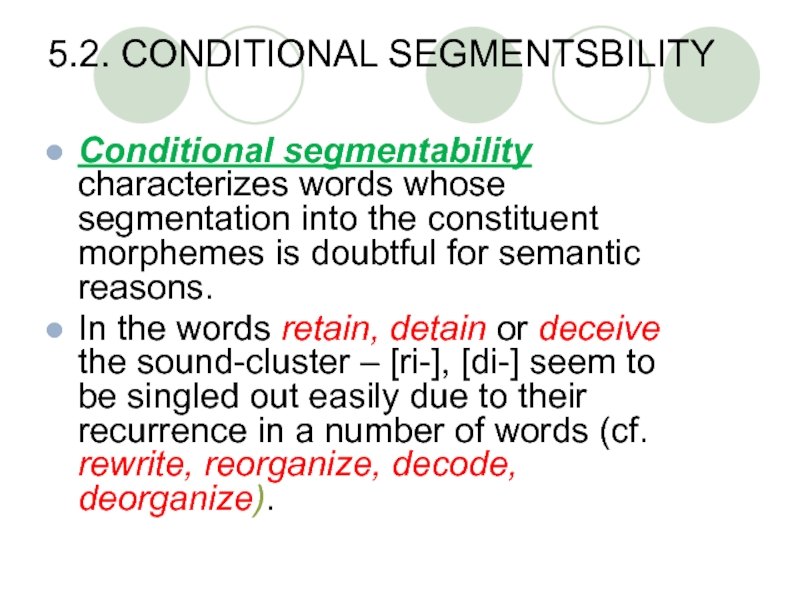
![Neither [ri-], [di-] nor [-tain], [si:v] possess any lexical or part-of-speech meaning of their own.](/img/tmb/5/464272/167acbe9fbb5bd366cfd39e2644d46bb-800x.jpg)
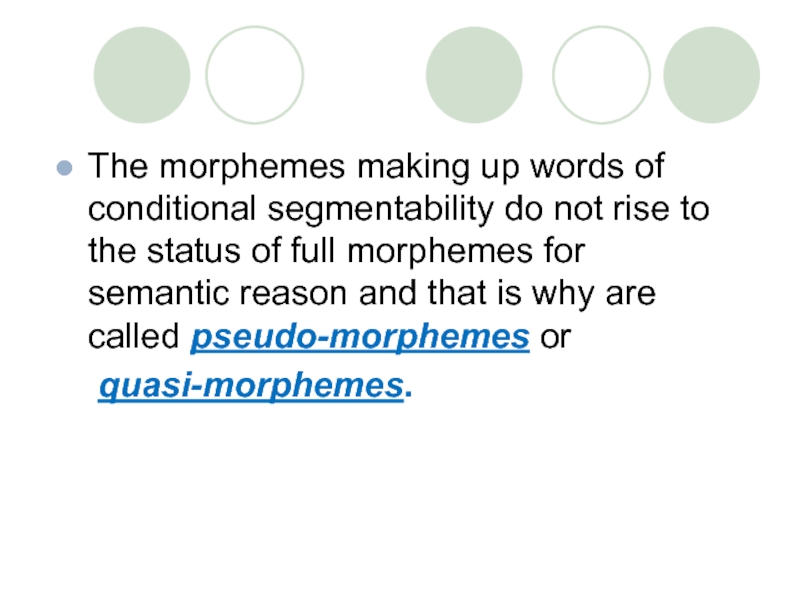
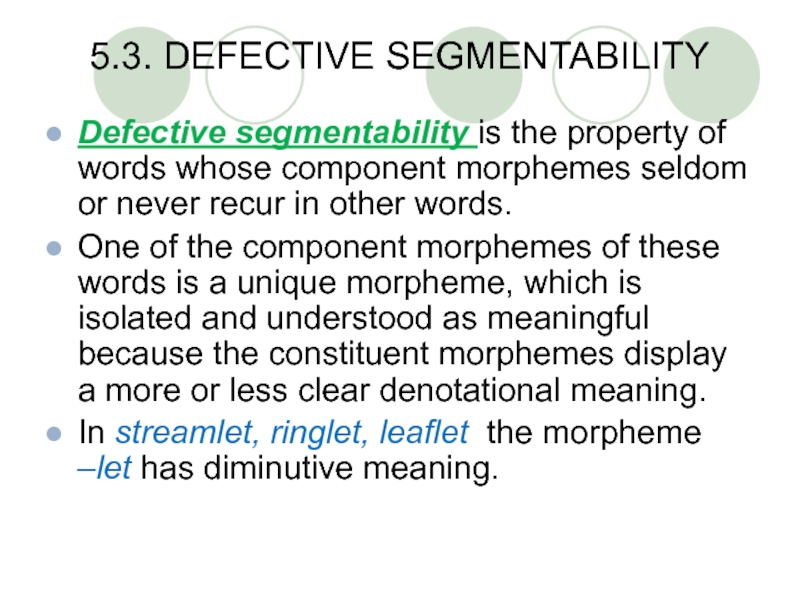
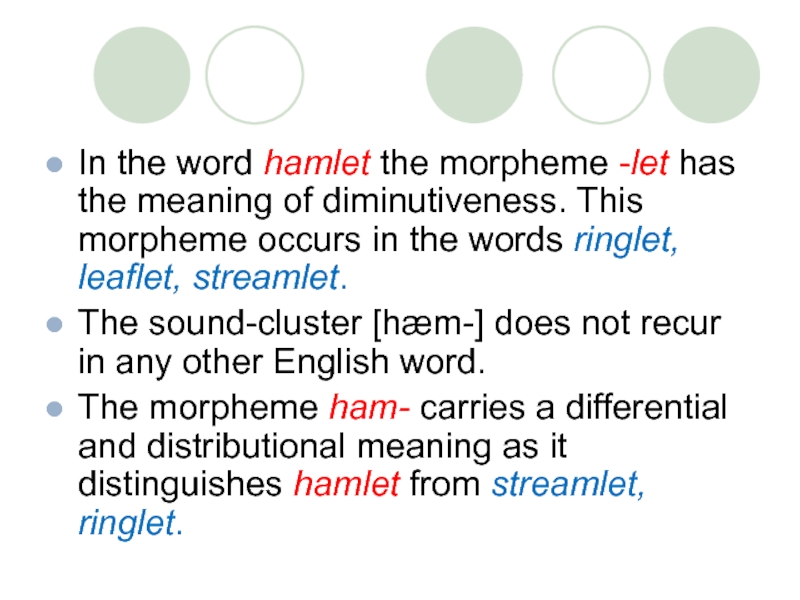
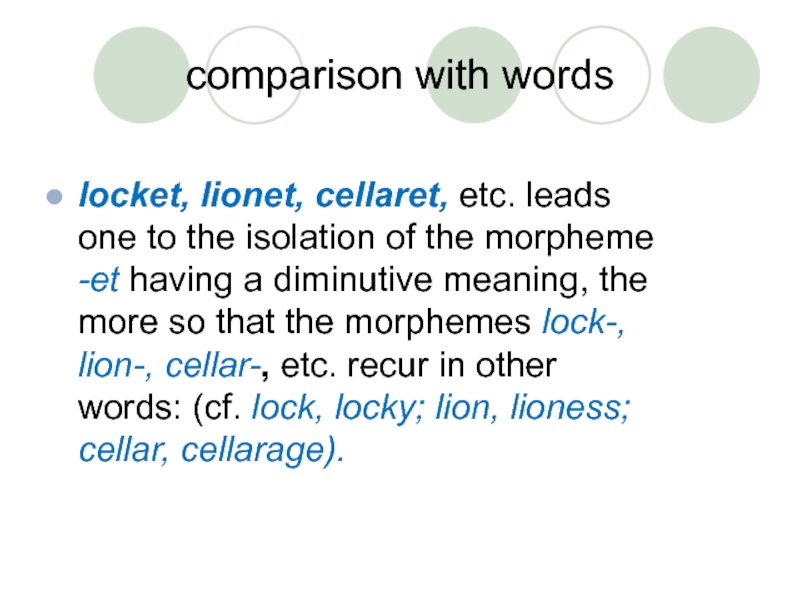
![The isolation of the morpheme -et leaves in the word pocket the sound-cluster [роk] that](/img/tmb/5/464272/b502e851df1674962702a75c019e4bb7-800x.jpg)
